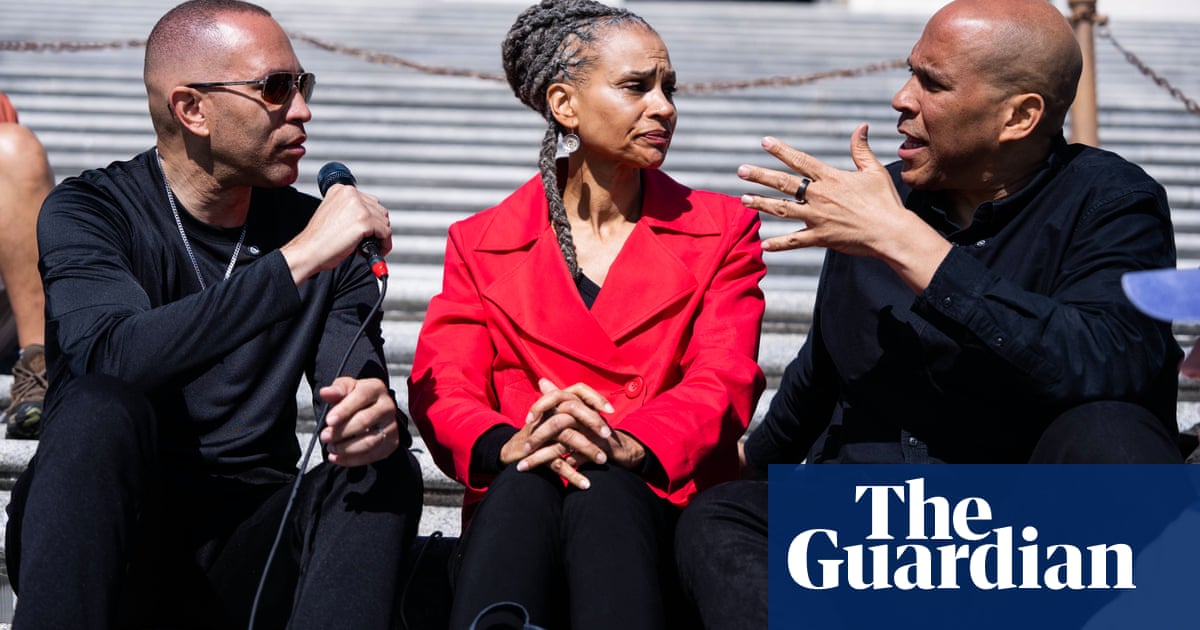House minority leaderHakeem Jeffriesand New Jersey senatorCory Bookerwere holding a sit-in protest and discussion on Sunday on the steps of the US Capitol in opposition toRepublicans’ proposed budget plan.
Billed as an “Urgent Conversation with the American People”,the livestreamed discussioncomes before Congress’s return to session on Monday, where Democrats hope to stall Republicans’ economic legislative agenda.
The proposed budget for the 2026 fiscal year,the New York Times reported on Friday,includes cuts to programs that support childcare, health research, education, housing assistance, community development and the elderly.
“Republican leaders have made clear their intention to use the coming weeks to advance a reckless budget scheme to President Trump’s desk that seeks to gut Medicaid, food assistance and basic needs programs that help people, all to give tax breaks to billionaires,” Booker and Jeffries aid in a statement.
“Given what’s at stake, these could be some of the most consequential weeks for seniors, kids and families in generations,” they added.
Bookerwrote separately on X: “This is a moral moment in America. Sitting on the Capitol steps with Leader Hakeem Jeffries this morning to discuss what’s at stake with Trump’s budget and affirm the need for action to protect Medicaid, food assistance, and other safety net programs.”
Booker and Jeffries started their sit-in around 6am and were joined by lawmakers including Democratic senators Chris Coons and Angela Alsobrooks and representatives Gil Cisneros and Gabe Amo, among others.
Reverend Dr William J Barber II and the National Education Association president, Becky Pringle, also joined. Pringle said the Trump administration was perpetuating “the greatest assault on public education that we’ve ever seen in this country”.
Democrats and independents have added a new degree of physicality to their opposition to the Trump agenda. Earlier this month, Booker set a new record for the chamber’s longest speech when he held the floor, without a bathroom break, for more than 25 hours.
Booker said he was doing so with the “intention of disrupting the normal business of the United States senate for as long as I am physically able” in order to protest the actions of Trump and his administration.
The Vermont senator Bernie Sanders, an independent, and the New York representative Alexandria Ocasio-Cortez have been on a “Fighting Oligarchy” nationwide tour of the US to protest the “oligarchs and corporate interests that have so much power and influence in this country”.
On Sunday, Sanders, who has accused Democrats of significantly ignoring working-class priorities, said that the party does not have “a vision for the future”.
“You have Democrats appropriately, and I’m working with them, talking about Trump’s movement toward authoritarianism, vigorously opposing the so-called reconciliation bill to give over a trillion dollars in tax breaks for the 1% and make massive cuts to Medicaid, nutrition and housing, opposing what Musk is doing to dismember the Social Security Administration and the Veterans Administration, making it hard for our veterans to get decent healthcare or benefits on time,” Sanders told NBC’s Meet the Press.
Throughout Sunday’s livestreamed sit-in, groups of curious passersby also found themselves sitting on the Capitol steps listening and weighing in on the discussion.
